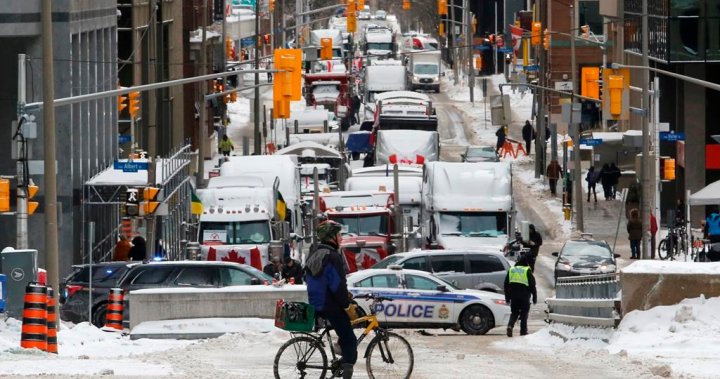
Economic impacts of trucker convoy protests could be felt for months, experts warn
Global News
Security costs of the 'Freedom Convoy' could soar to $2.5 million a day in Ottawa, and observers say the ripple effect on tourism and local business adds to the economic toll.
First Bite Treats has been through a lot in the six months since it first opened in Ottawa’s Byward Market.
Starting this year with a COVID-19 lockdown was “really disheartening,” says owner Abdallah Jama. He was hoping to turn things around in February with the reopening. Then the so-called “Freedom Convoy” descended on Parliament Hill.
“Business has been, to be frank, pretty tough,” Jama tells Global News. His shop is made for foot traffic with Instagrammable touches including a giant pink wall of flowers with a fluorescent sign that reads “Love at first bite” to complement his “croffle” creation — a cross between a croissant and a waffle.
As a small business owner, he says he can’t afford to shut down, even though his store, located on Sussex Drive, is a stone’s throw from the bulk of the disruption on Parliament. He goes into the store seven days a week, but sees reduced traffic and difficulties sending out delivery orders because he says drivers with Uber Eats and Skip the Dishes don’t want to get stuck in convoy-related traffic.
Often, the customers who come in are not wearing masks, which results in “some back and forth,” Jama says. It’s just another hassle that this business owner has been dealing with for now 12 days in a row.
Jama and business owners like him in Ottawa are collateral damage as the protest stretches into a second week. The city says security costs alone could soar to millions of dollars a day, and observers say the ripple effect on tourism and local business adds to the economic toll.
The City of Ottawa tells Global News that so far daily policing costs are around $800,000. On top of that is an additional $1 million in city services. Ottawa Mayor Jim Watson on Monday requested additional help from the federal and Ontario governments for an extra 1,800 agents which, if granted, would push daily policing costs to $2.5 million.
